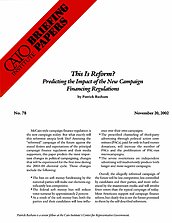McCain-style campaign finance regulation is the new campaign reality. But what exactly will this reformist utopia look like? Assessing the “reformed” campaign of the future against the stated desires and expectations of the principal campaign finance regulators and their media supporters, this paper predicts the most important changes in political campaigning, changes that will be experienced for the first time during the 200304 electoral cycle. Those changes include the following:
- The ban on soft money fundraising by the national parties will make our elections significantly less competitive.
- The federal soft money ban will reduce voter turnout by approximately 2 percent
- As a result of the soft money ban, both the parties and their candidates will lose influence over their own campaigns.
- The prescribed channeling of third-party advertising through political action committees (PACs), paid for only in hard money donations, will increase the number of PACs and the proliferation of PAC-run microcampaigns.
- The severe restrictions on independent advertising will inadvertently produce both longer and more negative campaigns.
Overall, the allegedly reformed campaign of the future will be less competitive, less controlled by candidates and their parties, and more influenced by the mainstream media and will involve fewer voters than the typical campaign of today. Most Americans support real campaign finance reform, but clearly this is not the future promised to them by the self-described reformers.

This work is licensed under a Creative Commons Attribution-NonCommercial-ShareAlike 4.0 International License.

